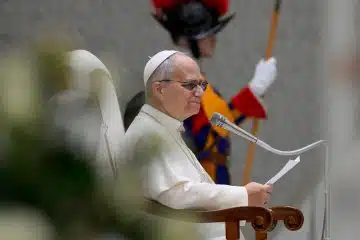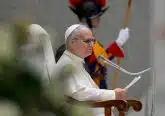Pope to young people: in the social media age, do not live your faith in isolation
Pope Leo XIV speaks extemporaneously, in English, with members of the International Youth Advisory Body. In prepared remarks consigned to the young people. the Holy Father encouraged them to focus on synodality, mission, and participation, in order to counter isolation and help the Church reach out to those in need.
By Isabella H. de Carvalho
In prepared remarks consigned to members of the International Youth Advisory Body (IYAB), Pope Leo encourages young people to focus on synodality, mission, and participation in order to counter isolation, be close to Christ, and help the Church reach out to those on the margins.
The Holy Father on Friday chose to speak extemporaneously with IYAB, a body linked to the Dicastery for the Laity, the Family and Life that aims to bring the perspective of young people to the Holy See on various issues central to the Church’s mission. Since Tuesday, the IYAB has been meeting in Rome to reflect on topics that affect young Catholics, with the three themes of synodality, mission, and participation as the focus of their discussions.
In his prepared remarks, Pope Leo writes to the members of IYAB, “You represent many of your peers, and through you, they also can ‘speak’ to the Church.” He assured them, “Your voice is heard and taken seriously. Your presence and contribution are invaluable.”
In the social media age, do not live your faith in isolation
Pope Leo emphasized that for young people, “the synodal Church” can be “a challenge, a catalyst”, as “it encourages them not to live their faith in isolation”, especially in the social media and digital age.
He recognized that “in recent years, many young people have approached the faith through social media, successful programs, and popular online Christian witnesses.”
However, he warned that “the danger” with this “is that a faith discovered online is limited to individual experiences, which may be intellectually and emotionally reassuring, but are never ‘embodied’.” This means it remains “detached from the ‘ecclesial body’” and not “lived alongside others in real-life situations, relationships or sharing.”
“All too often, social media algorithms merely create a sounding board for individuals, picking up on personal preferences and tastes, and ‘sending them back’ magnified and enriched with appealing proposals,” he continued. “Yet, everyone remains alone with themselves, prisoners of their own inclinations and projections”.
For the Pope, the antidote to this danger can be “experiences of lived synodality” which help “overcome the barriers of the self and encourage young people to become effective members of the family of Jesus Christ”.
Help the Church hear the voice of the weak and the poor
The Pope also pointed out that young people in a synodal Church are also “called to speak on behalf of their peers,” especially “the weak, the poor, and the lonely, refugees and those who struggle to integrate into society, or to access educational opportunities.”
“All too often, these voices are drowned out by the noise of the powerful, the successful and those who live in ‘exclusive’ realities,” he reflected.
A synodal Church wants “to listen to what the Holy Spirit says to young people” and “welcome their charisms, the gifts that are specific to their age and their sensibilities,” the Pope insisted.
Synodality, he added, helps show that, “in the image of the Holy Trinity, the Church is also a communion of persons, of the faithful of every age, language, and nationality, who journey together, enriching one another and sharing their spiritual gifts.”
Look beyond appearances, be leaders of creativity and courage
The Pope then highlighted how “authentic synodality” is guided by the Holy Spirit and thus it “leads to mission.” “It is not a question of the rules governing meetings. Instead, it is about making room for God’s action by listening to the Spirit,” he wrote, adding that the Holy Spirit always leads to “Jesus, who is the Truth.”
In order to discern, “in every age, how to bring the Gospel to everyone”, Pope Leo encouraged young people to “have open hearts, ready to listen both to the ‘inspirations’ of the Spirit and the deep ‘aspirations’ of each person.”
“You must look beyond appearances in order to seek the true answers that give meaning to life,” he emphasized. “You must have hearts that are open to God’s call and not engrossed in your own plans, and are willing to understand and sympathize before forming judgements”.
“The concept of mission also entails freedom from fear, because the Lord loves to call us to forge new paths,” he continued, urging young people to be “leaders of creativity and courage.”
Participation in the Church comes from spirituality, not ideology or politics
The Pope thanked the group of young people for their work, “which will provide new energy and momentum to the missionary heart of the Church.” He pointed out that the IYAB is part of a wider spiritual youth movement, which includes World Youth Day and regular youth ministries, and thus “keeps the Church forever young.”
In this regard, Pope Leo XIV stressed the importance for this group of young people to, “above all,” recognize that they are participating in the life and universal mission of the Church, directed at men and women all over the world.
“Where does authentic ecclesial participation come from? I would say that it stems from being close to the Heart of Christ. Its origin, then, is spiritual, not ideological or political,” he wrote.
The Pope in fact urged the members of IYAB, to look upon the young people of our time and their “hopes, dreams, and difficulties” with “Christ’s same compassion and try to envisage how the Church, inspired by faith, can go out to meet them.”
Be concerned for the suffering of others
He explained how, in the Gospel, Christ looks beyond “the small circle of disciples in front of Him”, as He desires that His message of salvation, unity of faith, and mutual love should reach “all people, including those who are far away and those who will come in the future.”
“The Lord always carries the whole world in His heart. This is the source of participation,” the Pope continued.
He thus invited the young people to become Jesus’ “friends through prayer, the Sacraments, and daily life” in order to “begin to feel as He feels”. This means to be “concerned for, and touched by, the suffering of others, their needs and aspirations” and it gives “rise to the desire to participate, to be part of the Church’s universal mission”.
“This involvement is also a sign of human and spiritual maturity,” he wrote. “While children are only concerned with their own needs, mature persons know how to share the problems of others and make them their own,” Pope Leo continued, encouraging the group of young people to “immerse” themselves in Christ.













